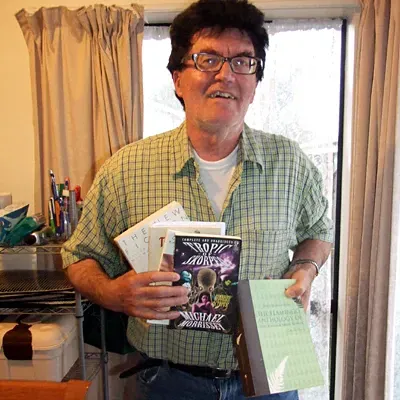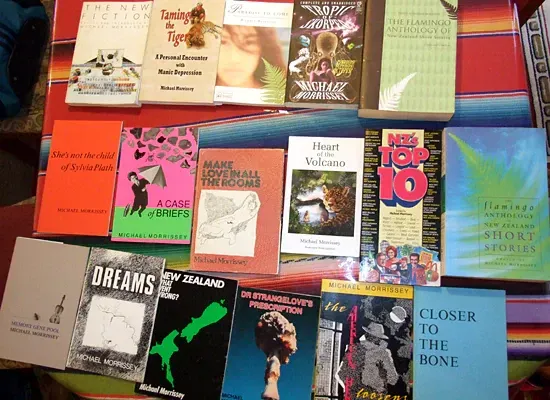Morrissey still hasn't peaked
Written by

One thousand literary reviews, 11 poetry collections, five editions of NZ’s best short fiction, three novellas, multiple writing residencies, one Fulbright scholarship and now, one novel. Michael Morrissey is a veteran writer who, at the age of 71, says he still hasn’t peaked.
He had other surprises for The Big Idea when Michael Botur sat down to interview him at his Papatoetoe home.
* * *
Michael Botur: I’m going to test you on some contemporary issues affecting writers. Do you know what GoodReads is?
Morrissey: Yes.
Print on demand?
Yes.
Hypertext? Tweeting? Kindle?
Yes yes yes, a couple of my books are on Kindle –[novel] Tropic of Skorpeo and [memoir] Taming The Tiger.
Ray Bradbury detested the internet. What do you think?
I’m an old fashioned uni snob, although I never completed a degree. Mass forms of communication encourage shallowness and brevity. PhD theses have become less thorough, the complexity of research has diminished.
Since you became first well-known as a writer in the 1970s, what has changed about writing?
When I was first appeared on the literary scene, one used to appear in [literary journal] Landfall. The wonderful thing about Landfall was that when you got even just a poem published in it, you knew that the NZ literary community – which at that time included Curnow, Baxter and Stead – would’ve read your poem. You became well-known overnight. I think in NZ you can have a fast take-off, then it’s a question what happens next. Next should be that you get recognised overseas. I guess I could say I’m world famous in NZ but not anywhere else… You have to keep producing writing to remind people that you’re around.
You slammed Eleanor Catton in your recent review of The Luminaries, which won the Booker Prize. Your review mentioned ‘bitchiness.’ Are you jealous of her?
I’m too distant from that arena to be jealous. When someone gets the Booker, we ask, Does this book merit the prize? That was what my review was about. Eleanor is talented, it’ll be fascinating to see how her career unfolds. When I was the age at which she published her first novel, I was getting drunk for the first time. When some new young person appears, you think ‘Wow,’ then ‘Does their work merit the praise they’re being given?’ I wonder if the people buying her novel are actually going to read it.
Why was your review of The Luminaries over-the-top, as you yourself have described it?
I was in a psych ward at the time…I don’t know…I’ve written 1000 book reviews. I do hatchet jobs quite rarely. I felt like it was obligatory to challenge it as a Booker Prize winner. I found the book hard going and uninteresting and laboured.
You commented on Catton’s physical attractiveness. Why?
The photos we saw of her before and after, she went from looking pensive to looking delighted. Comments on a writer’s body are not illicit or irrelevant from a journalistic point of view. I’m sure Salman Rushdie’s drooping eyelids have been commented on more than once.
What kind of books are guaranteed to sell?
There’s a difference between the world and NZ. Jenny Pattrick has been astonishingly successful in NZ, selling 30,000 copies. So a historical novel is what you want to write.
What will you be remembered for?
Being an arsehole! No, I think I’ll be remembered for my book launch for Paradise To Come. It featured a novella, Terra Incognita 1526, about a Spanish ship blown off course to here in 1526. I had Maori tribes as part of the plot. In 1997 I had a truly spectacular book launch for it, I had a Spanish ship arriving and a Maori war party were going to meet the Spanish and have a mock battle. But it was sabotaged by Arthur Harawira, who had decided that it was a celebration of a real conquest, whereas in fact it was fictional. He started assaulting the Conquistadors with his taiaha. There was nearly a riot. It was front page news and I had 40 interviews about it. It’s like with Salman Rushdie: you think the controversy will spur sales, but it doesn’t really. People became more interested in what punishment Arthur was going to have. The book launch was designed to be the greatest of all time – and arguably it was.
Why is the Western literary canon indispensable?
Younger people need reminders of the past and the tradition that we inherit, such as Homer and Bible stories, Samson et cetera... They’re part of the Western canon and they’re great stories.
What do you think about the Random House-Penguin merger?
One’s chances of publication are reduced, so the merger is not desirable. It’s part of globalisation, which is overwhelming our planet’s media. Most successful small publishers do poetry, such as Cold Hub Press. They are on a very small scale but at least they’re independent of the globalisation phenomenon.
We’re going through a new revolution which people like me are finding hard to deal with. Instead of book shops being the medium for transmitting books, they come out electronically and the standards are being lowered. I read recently that a lot of five-star reviews on Amazon.com are faked. In the past if you read a review written by critics in the London Review of Books, it wasn’t manufactured or underhand, it was authentic. Frankly, I find the contemporary situation bewildering because everything is moving so fast.
What’s the best thing you’ve ever written?
Tropic of Skorpeo (Steam Press, 2012) is unlike anything that’s ever appeared before. In a sense it’s highly original. Apart from that, my latest book Memory Gene Pool would be my best book of poetry.
So you haven’t peaked?
I suffer from manic depression. When I get mania, my idea flow goes up. At the moment I’m in a quiet phase so I’m hopeful for the future. I’m hopeful for my two novels [written but yet to be published.]
Could you have written Tropic of Skorpeo if you weren’t manic?
I wrote that work when I was technically not manic, but …The manic thing gives you energy, if you’re a writer, and it gives you patterns of ideas you might not have got.
Are there too many literary publications these day?
Literary magazines are both a positive and a negative. Quite often people who have not been in a literary mag write a novel and go straight into the mainstream. But it’s always nice to see a new venue or new mag. Landfall and Sport are both still the leaders and the online ones, which are mainly poetry, do a good job, but their standard isn’t quite as high.
Did Victoria University Press give Eleanor Catton an unfair advantage over other writers by investing so much promotion in her?
I resist that question. VUP has an excellent record of publishing many gifted writers, and good luck to them.
Do writers get better as they get older?
When I was young it was generally thought that a writer peaked between age 40-60, and by the time you get to 70 you’ve explored most of you major ideas… If you look back in the history of literature, you find most major works were written between ages 35-60 rather than 71, which I am. But C. K. Stead is writing fluently at the age of 80, and everyone is tending to live longer – including authors. In the 19th century it was common for authors to die of tuberculosis or syphilis relatively young. Guy de Maupassant and D. H. Lawrence died at 44. Mansfield died at 34. So they didn’t have a chance to get older and better.
Can you think of any NZ writers who have been only praised and never criticised?
Katherine Mansfield and Janet Frame, although [book critic] Ross Brighton said Frame had had adverse criticism. There’s always someone who dislikes someone. Tolstoy didn’t like Shakespeare; Shakespeare wasn’t appreciated until the 18th century. Everyone gets criticism.
How did it feel to have young writer Ross Brighton criticise your review of Catton?
The term sexist is often applied to men in the literary hemisphere who criticise women. He gave a kneejerk response. The defence of Catton against me was an example of chivalry.
- Michael Morrissey’s debut novel Tropic of Skorpeo at Steam Press
